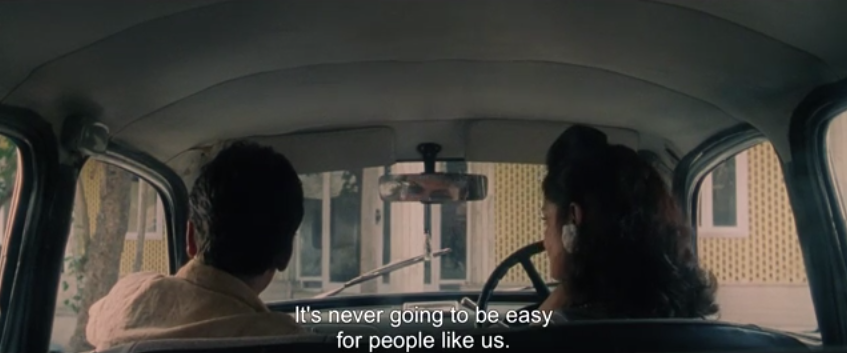Miss Lovely (2012, 2014)
Two brothers try to navigate the C-grade film business in 1980's Mumbai. Starring: Nawazuddin Siddiqui, Anil George, Niharika Singh.
I don't think anyone could walk out of the theatre or their living room *liking* this film. It's the movie equivalent of spending a night in an alley over a blocked sewer ... if you were in that alley for a good reason. Miss Lovely takes you to places YOU DO NOT WANT TO GO to see something you shouldn't miss.
As one of the characters argues at a pivotal point, "It's just a blue film. Easier than shooting bits." This film is about bits. People's bodies and lives in pieces and the tiny windows through which we try to see each other. Ahluwalia's direction and K. U. Mohanan's cinematography force us to experience only one side of most conversations, often only one face out of two or three in a room. We're never allowed comfortable, wide, over-over-two shot sequences (there are almost none to be found), but must make do with non-consensual angles and peep-show fragments .
One oft-used camera method--filming a character in power or in charge for a period before showing the identity of the other person in the conversation (sometimes a prostrate character on the floor)--eerily reverses the claustrophobic and intrusive vision of c-grade camera techniques. Curiously enough, this gaze reversal is not from the perspective of any of the adult film actresses, but rather the "view from below" of one/both of the filmmaker brothers.
Another type of a shot, a lingering wide angle with women staring towards the camera in curiosity or triumph at the plight of one of the brothers, captures moments of thoughtful female observation to counter the typical shut-eyed "writhe and let it happen to you" shots of exploitation films.
This all makes you feel, if not understand, the multiple levels of exploitation involved in the illegal "erotic" cinema industry, including the role of banking and police officials in perpetuation--through bribery and brutality. The b-grade industry is a harsh older brother, and doesn't give a whit about c-grade upstarts who want to cross over...except if they can benefit from that desperation. It's hard to name one group that is more despicable than another. With all the horrible types of victimization to choose from in this film, one of the most dehumanizing acts pictured is still the police bust of an adult film shoot. Here, no one is really pure, and even those who appear so are perhaps "performing." If one character is redeemable, we hope (for a time) it is Nawazuddin's silent protagonist. But, "hope" might be the most dangerous thing of all.
Things I still am thinking about:
1. What, if anything, the final shift from reels-in-suitcases to VHS/multiple screens towards the end of the film is saying, beyond the passage of time. Perhaps the idea that technology only solidified the industry? Those working with the new technology looked considerably "better off."
2. The thin social veil between the c-grade and the b-grade industries; for many people, a small but impenetrable wall between heaven and hell.
The same circles might even end up partying in the same discos, but are ALWAYS palpably separate in terms of opportunities and options.
3. Why the older brother is so intent in ruining his younger brother's "love story" on several different levels (both his dream film and his dream girl).
4. The idea that women should be respected as "mothers and sisters" and the de-facto linkage: a woman is ONLY important to treat well when she's YOUR mother or sister.














I picked up the DVD of the film this time. Now I'm wondering if I should even watch it so I can be more depressed than I already am!
ReplyDeleteI gather that coming home has been tough for a number of reasons, which I'm very sorry to hear. Definitely not the film to watch right now!
Delete